- Home
- Brian Garfield
The Lawbringers 4 Page 3
The Lawbringers 4 Read online
Page 3
We just got here, she thought. I'll let him have a few more minutes to thaw out. Just a few minutes. Goddamn blizzard—why couldn't it have held off another hour? Her flesh trembled inside the bearskin coat. She moved back close to the little fire.
A faint crack that might have been a gunshot reached her ears, lifted her head, turned her attention past the rump of the black-tailed bay horse to the mouth of the cave. Frowning, she got up from the dying fire and moved to the opening to look out.
Out of the swirling blue-white hailstorm emerged the shape of a man, a huge bull of a man made even bulkier by his heavy snow clothes, a man leaning forward leading his horse and holding one arm ahead of his face for protection.
“God, no,” the girl murmured. “That’s all we need. Son of a bitch.”
The advancing man, bracing against the wind, stooped to come into the cave. The girl stepped back to let him enter. The man put down his arm and she could see he had a bandanna tied across the lower part of his face. He pulled it down beneath his chin and said, “Michaela?”
“Howdy,” she replied in a flat tone that showed no warmth of welcome.
“Saw the wink of your fire,” the big man said. And even in the strange deadly world of the blizzard, she saw his eyes come around to rest on her and she saw the naked lust in his glance.
Then the big man looked down. “Your Pa all right?”
“He’s all right.”
“Got any more wood for that fire?”
“No,” she said.
“Well, you’re damn well not going to find any now. Better get the old man mounted. We’ll follow the canyon down to Rifle Gap. Can he make it?”
The old man looked up. “I can make it. What in hell are you doing here, Lutz?”
Lutz grunted. “Same as you, old-timer. Tryin’ to find shelter from the blow.” He tightened his big gloved fist on the reins of his horse and pulled the horse closer in behind him. “All set, Michaela?”
She didn’t like the way her name sounded on his lips. She gave him a flat stare of evident challenge and turned to help her father get to his feet. He stood stooped over under the cave ceiling, his wooden leg wobbling a little.
“I can make it,” he muttered in a cracked voice. “Sure, I can make it. In ’Seventy-one I weathered a worse blow than this, and had nothin’ but my hands to build a shelter with. I can make it. I can make it.”
While he kept talking, the girl and the big man lifted him onto the saddle of his horse. The big man, Lutz, held the old man steady while the girl mounted her own animal and picked up the lead reins of the old man’s mount. Then Lutz climbed onto his own horse, a big barrel-chested gray, and pulled the bandanna up over the bridge of his hawk nose. His voice came to her muffled by his bandanna and the wail of the storm above the canyon. Hailstones hit her with wicked intensity.
Lutz said, “Come on. Stick close.”
They put their horses out into the canyon and Michaela could barely see the big man’s broad swaying back through the snow; she kicked her horse savagely and yanked on the lead reins of her father’s horse, and felt the world in continuous collapse all around her.
CHAPTER VI
THE ONLY WAY to tell direction, Jim Brand knew, was to keep his face directly into the wind, which was from the north. He had to spur the calico with a good deal of reluctant energy before the animal agreed to plod into the force of the storm.
Fingertip-size balls of ice battered man and corpse and horse with equal indifference and equal savagery; he knew if he came out of this alive, he would be bruised on his face and legs where the thickness of the sheepskin mackinaw did not protect him. It was harsh and bitter beyond anything in his experience, this day of night skies and wheeling elements. An instinctive desperation drove him with gritted teeth and eyes all but shut into the hungry, licking maw of the norther.
The blast of weather was powerful enough to upset his sense of balance and make him completely uncertain of whether he was going uphill or down or on a straight level.
With amazing speed the storm had struck, and with swiftness equally as surprising it had enfolded him within its crushing grip and blackened vision to the point where he could just dimly make out the horse’s bobbing, turned-back ears. At best he would come out of it half frozen and bruised; at worst—there was death, always death: a thing he did not fear, but rather regretted the prospect of. Death was nothing, literally nothing. But there were tastes and sounds and warmths that he still wanted to experience.
Perhaps it wasn’t much of a life, his thorny existence, but it usually came close to satisfying him. Especially at a time like this when his money belt was full of gold. Suddenly he cherished very much the prospect of spending that gold. It might be different if he was trying to outride a losing streak.
Wheeling, bucking, pitching like an angry animal, the storm fought him and the calico at every struggling step. He felt the horse tremble under him and knew that under its double burden it could not last long in this fierce struggle. Brand’s curse was torn from his lips by the wind. Everything in sight was a mottled pointillism of blue and white and gray; once again he had the sensation of being at the vortex of a vast tossing sea.
He held his rough bearing into the face of the wind, which he hoped would be north; there was no telling at what instant the storm might switch directions. Huddled inside the mackinaw, batting his arms across his chest, flinching away from ice stones that struck at his defenseless face and broadcloth-covered legs, feeling the tense fatigue in his knees and thighs where they tried to maintain a grip about the calico’s barrel, he knew with a bitter certainty that his time was very limited. Man and beast could combat only so much.
Only the deputy was uncomplaining. Only the deputy failed to recoil from the punishment of hail and wind and cold and lost bearings; and there came a time when, half-frozen and going slowly numb, Jim Brand blinked and jerked himself upright and knew that he was dangerously close to accepting the pleasant warm invitation of sleep that the storm offered as a treacherous comfort. It would be very easy.
“Got to get under cover,” he muttered drowsily, and the wind tore the words and whipped them away unheard.
In his dreamlike state of half-clinging wakefulness it occurred to him that he could kill the calico, slit its belly open and crawl inside for warmth. But this would offer a few hours’ grace at best, and the blizzard might blow for days. And a little corner of irony in his mind reminded him that he was ever a fastidious soul; the thought of cowering inside a stinking mess of gutted horseflesh was more repugnant than the prospect of a clean, cold death by freezing.
At least it would be pitting his own wits and guts and strength in battle fairly joined; for that was what it had become now—a personal and individual contest between him and the roaring world, between Jim Brand and an angry God.
The thought of a raging Jehovah brought to him an image out of the ghostly past, a hovering vague picture of a shirt-tail relation of his who had taken up the cudgel of hellfire and brimstone and gone tramping about the countryside preaching sulphurous torture and eternal terror.
Brand had dismissed his cousin as a bigot and crackpot, and nothing since had served to change his mind—and today he knew with a renewing vigor that neither storm nor any other weapon of such an antagonistic Power would ever beat him to his knees.
He knew his mind was drifting; he fought for sentience. His legs were going numb, feeling rubbery, and it was becoming more and more difficult to stay clamped on the horse. With apprehension rising in him like mercury in a thermometer thrust into the sunlight, he slid off the back of the horse and went out in front to break trail, leading the calico, plodding through knee-deep drifts and barren-swept rocks and stamping his feet, and feeling a certain grim satisfaction that came from the sharp, burning, tingling sensation that rewarded his energy. But another problem revealed itself: exhaustion, in his labored breathing and the slow agonizing ache that shot up his legs with renewed feeling.
An almost im
perceptible shift in the power of the wind let him know that he had achieved the crest of a land rise and was now on the downhill side. He plunged forward, reins wrapped tight around a glove while he beat his hands together with great sweeping strokes, yanking hard against the calico’s jaded resistance. The world was a vast blind obscurity and all he had was a shrinking hope that somewhere in the blue-white trough of weather below him was the ghost town he sought.
His mind began to drift again. He stumbled and went down, and fought to his feet. In a swirling eddy of life like this one a man had to keep thinking consciously in order to prevent his mind from drifting irretrievably away; he had to clamp his thoughts on something, and he clamped them desperately on dead-alive fragments of the past, memory wheeling from place to place and time to time with the storm making a uniform blank slate for his memory to chalk scenes on.
His senses were slowly unraveling and he threw his whole concentration into the fierce wheeling kaleidoscope of images from bleak and bitter years—the face of a woman in Baton Rouge; frogs croaking across the steamy bayou dark; two young men spoiled with pride, dueling in the marshes; the heavy weight of liquor fumes and stale tobacco smoke overhanging men tensed around a poker table with a massive stack of gold coins making a wicked blaze in the center of the hunched circle; the stench of the Dallas jail; a drumming grim crowd of white-hooded night riders on the Atlanta coach road in the deeps of a moist summer night; the throaty voice of a woman humming beside him in a bed soaked with sweat; the abrupt violent crash of gunfire that shattered the silence of a Kansas street at sundown; the self-important smug grin of a long-haired marshal putting him on a stagecoach in Fort Griffin; the glitter of light racing fragmentarily along the blade of a drawn knife that seconds later he had plunged hilt-deep into the throat of a card sharp in an opulent cardroom aboard a Mississippi steamer; the solid hard bucking of a revolver in his fist, roaring savagely and cutting down a bearded enemy as if its bullets were hatchets—these were the bitter thoughts offered by dregs of three burned-out decades of living for James Tecumseh Brand, savored by dour blandness and half-warm regrets.
Of it all he regretted most the enforced loneliness of his itinerant existence, and the startling preponderance of times when his actions had been caused not by will but by instinctive reaction.
He had not charted the course of his life; he had let it be plotted for him by a series of unhappy events against which he had reacted in sudden haste or instinctive anger or pleasures swiftly evaporating, evanescent like mist under sunlight.
Now, though, there was no choice but to react, simply and decisively; or die. He had to fight back.
Snarling sleet whipped him, tumbling and roaring with all the vicious voices of magnified thunder like a surf gathered against the ear. He plodded a step at a time into the great pounding fists of a merciless enemy. Out ahead perhaps was Rifle Gap, which would serve him as a devil’s temple against the storm of God.
He grinned fiercely and was blinded by the wheel and slap of wind; he walked ahead and was driven back by it; he fought with all his fibers and was weakened by it. But through all this he knew with a deep heartening certainty that for the first time in an uncounted number of weeks and months he was fighting for his life and savoring the battle. It was a wild exhilaration, the knowledge that once again he cared; and even that much, for a jaded man, was a great deal.
He put his foot down and broke through the half crusted surface of a drift and waded up to his hips, dragging himself through the heavy blanket of fallen ice stones. And then his foot came down and landed on nothing but air, and his stomach lurched sickeningly as he looked down into invisibility. His tight hold on the reins and a backward jerk of the calico’s head dragged him back from the fall and he had to turn aside and pick a path down what had suddenly become a steep descending slope.
Hard, jagged sheets of ice flayed him. The wind was a vast pounding in his ears; the dry flaky chill of racing air made it hard to breathe and he felt like a man drowning. But the line of descent soon carried him below the line of the ridgetops, and here where the fingers of the gale did not reach, the air lost its force and seemed warmer, and the hailstones fell more vertically. But when he looked back, though the reins tugged his arm, he could not see the calico horse; he reached back and felt its muzzle and was reassured, and plunged onward. The land fell steeply away, carrying him down.
After minutes that might have been hours he came onto the canyon floor. Steep walls to either side effectively canceled the power of the wind. If this was not the canyon where Rifle Gap lay, he was done. He stumbled forward, hauling the horse along. Several times he walked flat into a rock wall and had to swing aside through the series of sharp switchbacking turns that the canyon made on its way deeper into the mountain fortress.
He tried to dredge up an image of remembered terrain, and so far as he could tell this might well be the canyon that led into the town. But he found no buildings, no town. And now, despite all his tramping and battling, his feet were numbing.
The tingling pin pricks of sensation that traveled up from them lessened steadily. His jawbone crept forward to set itself in a flat-shelved, grim line, and his lips peeled back from his teeth in a taut grimace of determination. Fear was a little round hard core that grew and deepened in him. He told himself, I will live.
Abruptly the fierce drive of hail slacked off, and he felt a startled wonder, for the air still swirled with pellets and he could see nothing. But when he looked back in the dim half-light he could clearly see the horse and its grisly burden, and then, lifting his eyes, he understood. He had stumbled upon the protection of an overhanging rock shelf on the face of the cliff-wall—a shallow cave. The shelf overhead protected him from the fall of hail.
Temporarily out of its blast, he sagged against the cliff to gather energy, and then for a while standing in one place he hopped energetically from one foot to the other and was slowly rewarded by the seeping return of circulation to his feet. It would not last him long, he knew, but it would help.
His eyes took idle note of a dead fire on the floor of the cave, dark ashes against the damp rock. Gritting his teeth, he plowed out into the storm again. The town must be close now. It had to be.
Recklessly he plunged ahead, using up his waning strength with rash abandon. If this final bold effort did not succeed, he would drop, he knew. But the patience to keep plodding slowly through the endless wailing storm had left him when the numbness of his feet assured him that his time was severely limited. The only way to win, he had found long ago, was to accept the cards that were dealt and be willing to take risks in the playing of them.
Deep snow overlaid by a frozen pudding of hailstones clogged his footsteps, and the burdened horse was a heavy drag against his leaden arm, but he clung stubbornly to the reins as he might cling to the last rope holding him up over a limitless fall.
The horse and the dead man across its saddle were the only companions he had in this violent conflict. The reins were a connecting line with—what? A beaten horse and a dead man? His mind tried to grope for a shred of meaning in that. He thrust his boots forward one at a time until with startling abruptness his boot snagged against something and he flung a hand out to catch himself and it struck something solid.
Blindly he fumbled his hand along a half-round smoothness, and realized with quick relief choking his throat that it was a wall of hewn logs.
He uttered a great shout that he could hear only faintly before it was dragged away from him by the howling storm. Still clutching the reins, he felt his way along the wall to its corner, went around and felt a break, which was a door. He found a latch and swung the wide door open, forcing it back with fingers he could no longer feel.
He wheeled inside, into a warm pitch dark, hauling the horse after him. The wind slammed the door home. He dropped the latch and a great numbing pressure eased its fishlike grip on his body and mind. Without the shattering wind, the pounding of hail, the endless howl in his ears, the scrape and
strike of cold across his flesh, he felt like a man hitting bottom after a long drop, as though white grinning death had turned a corner and retreated temporarily from sight.
Now there was only drained and utter numbness to fear.
The horse snorted. When Brand touched it, he felt it tremble beneath the stiff frosting of its coat. The loud wail of the storm was reduced greatly by the protecting building and he could hear faint sounds around the room, the strike of one hard object against another, the crush of earth. His clothes were congealed by a cold stiffness, crackling when he moved. Using his teeth to remove one glove, he put an unfeeling hand inside his coat and found a sulphur match and awkwardly scraped it alight against the wooden wall.
The yellow flicker of light revealed the interior of a stable. Five or six horses, steaming and exuding a slow odor of body heat, stood in stalls, and a glass-chimneyed lantern hung from a nail by his head. He put the match to it, turned up its wick and dropped the chimney over the flame. Lifting the lantern carefully down, he saw the exhausted calico standing with splayed legs braced apart.
His first concern was for his hands, and he pulled off the second glove and went to work, moving the fingers with a savage intensity, stamping his feet and moving about. It took time. Feeling prickled back in slow needles and a sharp quick pain set into his extremities. He was thankful for the pain. It might burn for hours, but it was there, and everything moved.
“Nothing wrong there,” he murmured with deep relief, rubbing his hands together briskly.
He turned the horse into a stall and set to work untying the deputy’s body. Unfastening frozen knots with burning, uncooperative fingers was a long hard job. At last he dumped the inert body into the stable runway.
That was when it occurred to his numbed brain to ask itself what the other horses were doing here. Six horses meant six people. It was a cold reminder that somewhere was a man with a buffalo gun and a desire to kill.

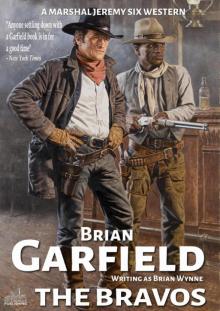 Marshal Jeremy Six #3
Marshal Jeremy Six #3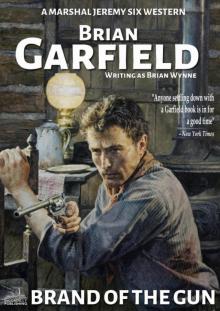 Marshal Jeremy Six #6
Marshal Jeremy Six #6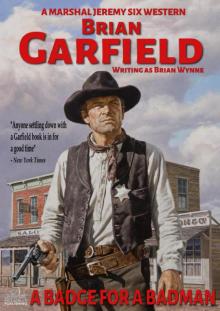 Marshal Jeremy Six #5
Marshal Jeremy Six #5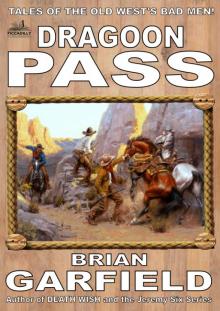 The Outlaws 2
The Outlaws 2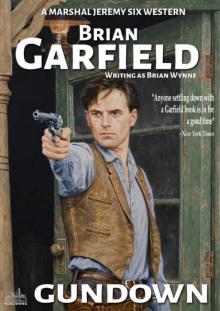 Marshal Jeremy Six #7
Marshal Jeremy Six #7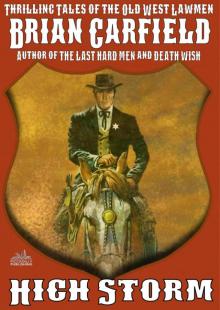 The Lawbringers 4
The Lawbringers 4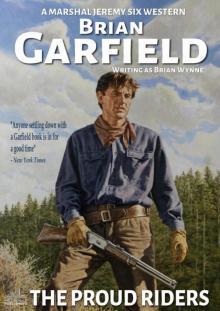 Marshal Jeremy Six #4 the Proud Riders
Marshal Jeremy Six #4 the Proud Riders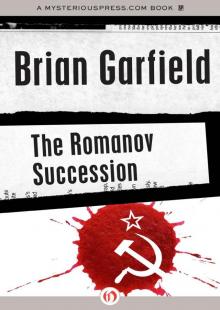 The Romanov succession
The Romanov succession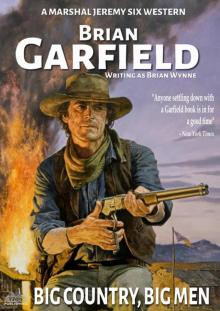 Marshal Jeremy Six #8
Marshal Jeremy Six #8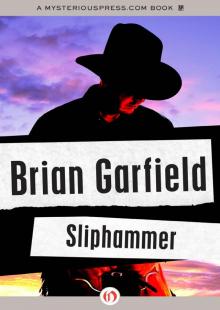 Sliphammer
Sliphammer Line of Succession
Line of Succession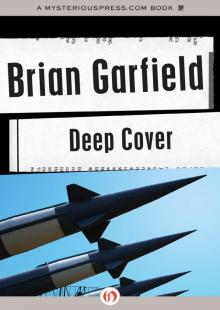 Deep Cover
Deep Cover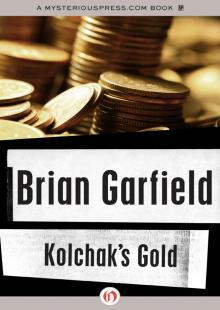 Kolchak's Gold
Kolchak's Gold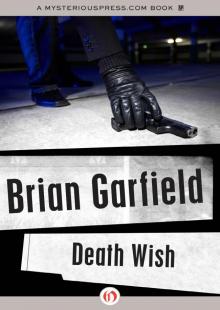 Death Wish
Death Wish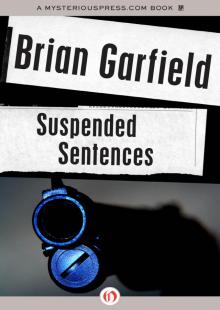 Suspended Sentences
Suspended Sentences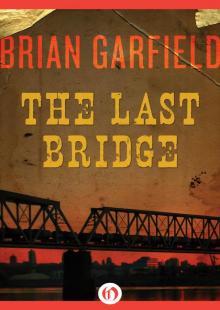 The Last Bridge
The Last Bridge Relentless
Relentless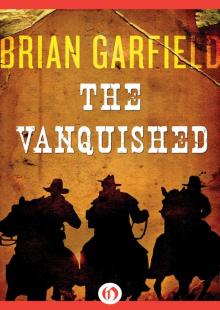 The Vanquished
The Vanquished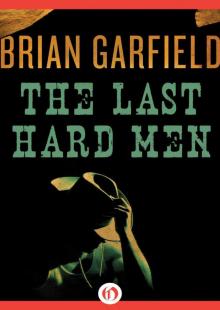 The Last Hard Men
The Last Hard Men Hit and The Marksman
Hit and The Marksman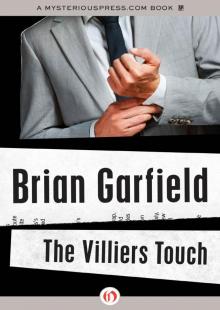 Villiers Touch
Villiers Touch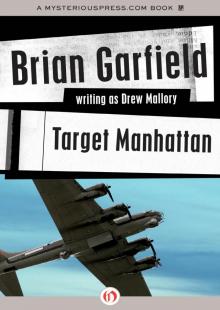 Target Manhattan
Target Manhattan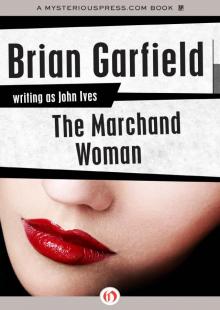 Marchand Woman
Marchand Woman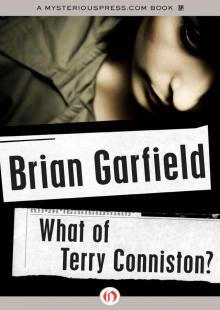 What of Terry Conniston?
What of Terry Conniston?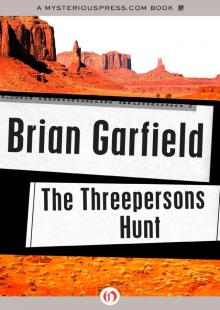 Threepersons Hunt
Threepersons Hunt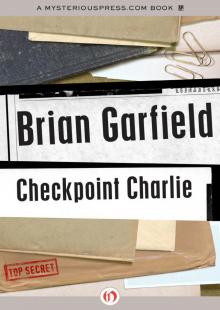 Checkpoint Charlie
Checkpoint Charlie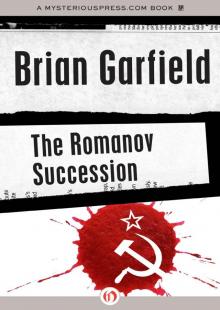 Romanov Succession
Romanov Succession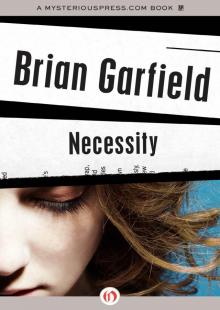 Necessity
Necessity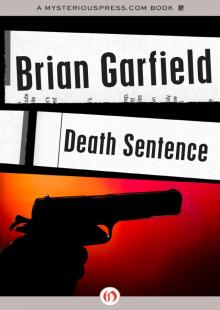 Death Sentence
Death Sentence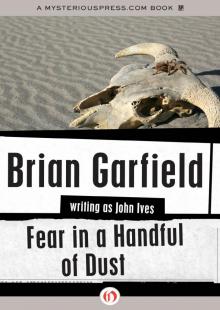 Fear in a Handful of Dust
Fear in a Handful of Dust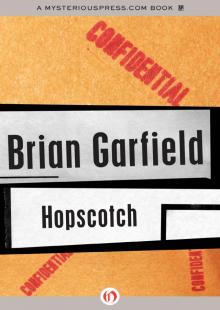 Hopscotch
Hopscotch